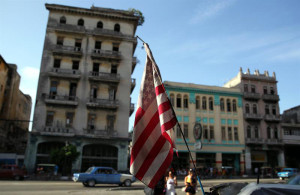REFLECTION ON THE COMPENSATION OF EXPROPRIATED OWNERS IN CUBA.
Now that US government representatives and Raul Castro is beginning to gather to discuss compensation for confiscated American properties in 1960, seems less academic discussion for this complex issue.
.. It is here several observations. The first is that such claims involve alleged material losses compensable in money or awards of equivalent value. The second is that there are plenty of former owners for various reasons, especially having had small holdings, lack a legal basis for realistic or documentary claims. The third is that there are many theoretically cash loss carryforwards that have no counterpart in physical properties such as buildings, land and machinery and equipment. This is intellectual property, such as copyrights, patents or trademarks; financial, bank deposits or government bonds; more losses unearned income, such as wages, pensions, annuities, earnings or interest.
Here are several ironies worth noting appear.
The first is the unequal distribution of opportunities to receive compensation, if ever this were to occur. The main beneficiaries would be the investors that are associated with the expropriated American companies. Then came the Cuban case they do not have the same opportunity to be compensated that seem to American investors, unless they can make successful claims on their behalf. It is obvious that history and its economic and political turbulence has disadvantaged Cubans.
But another irony comes from the claim by Raul Castro that the US compensate the Cuban Government for losses attributable to the embargo. In any case, these losses were suffered by the Cuban people, not by the state. The extraordinary thing is that the US demand that pays the Cuban government for the loss of Cubans. It’s like trying to expropriate again!
Will there be a fair compensation for those Cubans? From this follows another question: Why the compensation must be limited to those who suffered losses from expropriation? Are not there other Cubans and foreigners without having properties also suffered losses from the revolutionary actions?
This consideration expands the possibility frontier compensation maximum theoretically possible and still not cover all losses attributable to the revolution. It is out of these possibilities the immeasurable human cost caused by the loss of life years in prison, abuse, exile and all the anguish that Cubans have suffered in the totalitarian state.
Under these conditions the fairest to the problem of compensation solution is that Cubans can again become masters of their economy, to take charge of the country’s economic recovery and that can benefit from the fruits of reconstruction. But how foreigners or Cubans investors are willing to negotiate with the government of Raul Castro it is not compatible with this solution for several reasons.
First, because the government itself exclude the participation of other Cubans equal to foreigners and few Cubans favored by the authorities. And second, because those investors depend on the Cuban government to give them permission to invest and operate. This makes such privileged investors the benefits arising from the standardization and usurpers of the right of other Cubans to be compensated by way of unrestricted participation in their own economy. Which raises an inescapable moral question: if the fairest possible way of compensation for Cubans is directly participate in the benefits of economic recovery why others have suffered losses not only benefit? How is it possible to speak of a normalization of relations excluding many Cubans of their right to be compensated?
Unfortunately these considerations are not on the agenda of the process of normalization of US relations with Cuba. For various reasons, Cubans are now again in a situation where interests outside forces determine his fate. We must recognize that the interests of the majority of Cubans are helpless. I think it is the result of a failure of collective action that has made us unable to unite and organize in defense of our common interests. Lessons from history that future generations must learn if they want a free Cuba.
Agencies / DDC / Jorge A. Sanguinetty / Internet Photos / Excerpt.
The Cuban History / HOLLYWOOD.
Arnoldo Varona, Editor.
REFLEXIÓN SOBRE COMPENSACIÓN A PROPIETARIOS EXPROPIADOS EN CUBA.
Ahora que representantes del Gobierno de EEUU y de Raúl Castro se comienzan a reunir para discutir sobre la compensación de las propiedades americanas confiscadas en 1960, parece menos académico que hace años hablar sobre tan complejo tema.
.. Cabe aquí hacer varias observaciones. La primera es que tales reclamaciones involucran pérdidas materiales supuestamente compensables con dinero o concesiones de valor equivalente. La segunda es que hay infinidad de ex propietarios que por diversas razones, especialmente la de haber tenido pequeñas propiedades, carecen de una base legal o documental para hacer reclamaciones realistas. La tercera es que hay muchas pérdidas teóricamente compensables en dinero que no tienen una contrapartida en propiedades físicas, como construcciones, tierras o maquinaria y equipo. Se trata de propiedades intelectuales, como derechos de autor, patentes, o marcas; financieras, como depósitos bancarios o bonos del estado; más pérdidas por ingresos dejados de devengar, como salarios, pensiones, rentas, ganancias o intereses.
Aquí aparecen varias ironías que vale la pena destacar.
La primera es la desigualdad en la distribución de oportunidades al recibir compensaciones, si alguna vez esto llegara a ocurrir. Los principales beneficiados serían los inversionistas que estén asociados con las empresas americanas expropiadas. Después si acaso vendrían los cubanos que no tienen la misma oportunidad de ser compensados que parecen tener los inversionistas americanos, a menos que logren hacer reclamaciones exitosas por cuenta propia. Es obvio que la historia y sus turbulencias económicas y políticas han puesto a los cubanos en desventaja.
Pero otra ironía surge de la reclamación por parte de Raúl Castro de que EEUU compense al Estado cubano por las pérdidas imputables al embargo. En todo caso, esas pérdidas fueron sufridas por los ciudadanos cubanos, no por el Estado. Lo extraordinario de esa demanda es que EEUU le pague al Gobierno cubano por las pérdidas de los cubanos. ¡Es como querer expropiarlos de nuevo!
¿Habrá alguna forma justa de compensación para esos cubanos? De esa pregunta se desprende otra: ¿y por qué las compensaciones han de limitarse a los que sufrieron pérdidas por expropiaciones? ¿Es que no hay otros cubanos y extranjeros que sin haber tenido propiedades también sufrieron pérdidas por las acciones revolucionarias?
Esta consideración expande la frontera de posibilidades de compensación al máximo teóricamente posible y todavía no cubre todas las pérdidas achacables a la revolución. Se queda fuera de esas posibilidades el inmensurable costo humano provocado por la pérdida de vidas, años de prisión, maltratos, exilio y todas las angustias que los cubanos han sufrido en el Estado totalitario.
En estas condiciones la solución más justa al problema de las compensaciones es que los cubanos puedan volver a ser dueños de su economía, que se hagan cargo de la recuperación económica del país y que puedan beneficiarse con los frutos de la reconstrucción. Pero el modo en que los inversionistas extranjeros o cubanos están dispuestos a negociar con el gobierno de Raúl Castro no es compatible con esa solución por varias razones.
Primero porque el mismo Gobierno excluye la participación de los demás cubanos en condiciones de igualdad con los extranjeros y unos pocos cubanos favorecidos por las autoridades. Y segundo porque esos inversionistas dependen de que el Gobierno cubano les dé el permiso para invertir y operar. Esto hace a tales inversionistas privilegiados en los beneficios que puedan derivarse de la normalización y usurpadores del derecho de los demás cubanos a ser compensados por la vía de la participación irrestricta en su propia economía. Lo cual plantea una cuestión moral insoslayable: si la forma más justa posible de compensación para los cubanos es participar directamente en los beneficios de una recuperación económica ¿por qué otros que no sufrieron pérdidas han de beneficiarse exclusivamente? ¿Cómo es posible hablar de una normalización de relaciones excluyendo a tantos cubanos de su derecho a ser compensados?
Lamentablemente estas consideraciones no están en la agenda del proceso de normalización de relaciones entre EEUU y Cuba. Por diversas causas, los cubanos se encuentran hoy de nuevo en una coyuntura donde fuerzas ajenas a sus intereses determinan su destino. Hay que reconocer que los intereses de la mayoría de los cubanos están indefensos. Creo que es resultado de un fallo de acción colectiva que nos ha hecho incapaces de unirnos y organizarnos en defensa de nuestros intereses comunes. Lecciones de la historia que deben aprender las próximas generaciones si quieren una Cuba libre.
Agencies/DDC/Jorge A. Sanguinetty/Internet Photos/Extractos.
The Cuban History/ HOLLYWOOD.
Arnoldo Varona, Editor.







